Social Research on New Media: Reader Trust and Information Credibility
VerifiedAdded on 2021/06/17
|5
|1299
|36
Essay
AI Summary
This essay examines the complex issue of reader trust in social media as a news source. It references studies indicating widespread skepticism towards news found on social media platforms, despite their importance for marginalized communities. The essay highlights the challenge of distinguishing fact from fiction, the rise of fake news, and the potential for mainstream media to re-establish credibility. It discusses the factors influencing trust, including personal information concerns and the prevalence of clickbait articles. The research also points to a generational divide, with younger consumers showing a willingness to pay for high-quality news online. Ultimately, the essay underscores the need for social media platforms to address ethical concerns and improve the credibility of news content to regain reader trust. Desklib offers more resources and solved assignments for students.
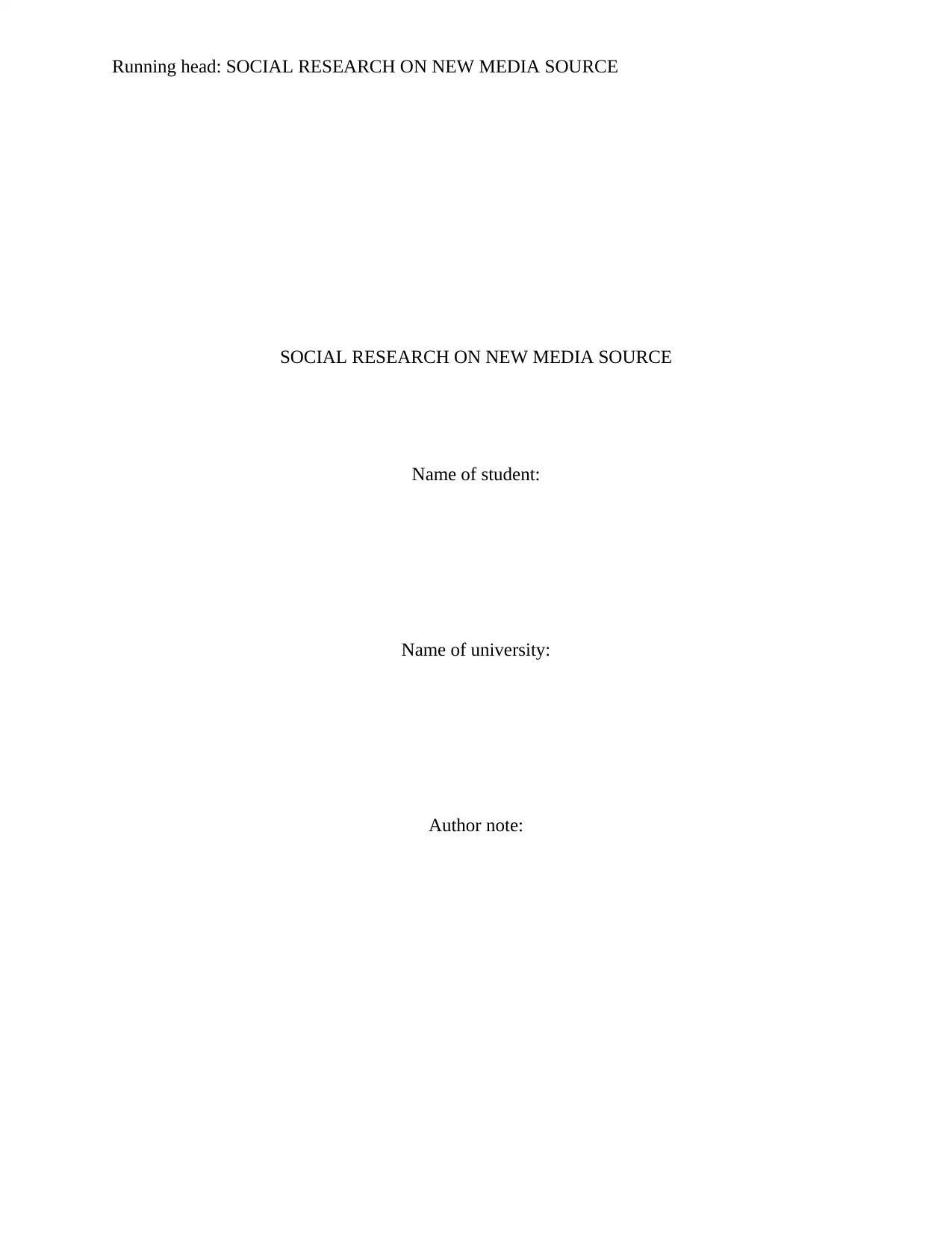
Running head: SOCIAL RESEARCH ON NEW MEDIA SOURCE
SOCIAL RESEARCH ON NEW MEDIA SOURCE
Name of student:
Name of university:
Author note:
SOCIAL RESEARCH ON NEW MEDIA SOURCE
Name of student:
Name of university:
Author note:
Paraphrase This Document
Need a fresh take? Get an instant paraphrase of this document with our AI Paraphraser
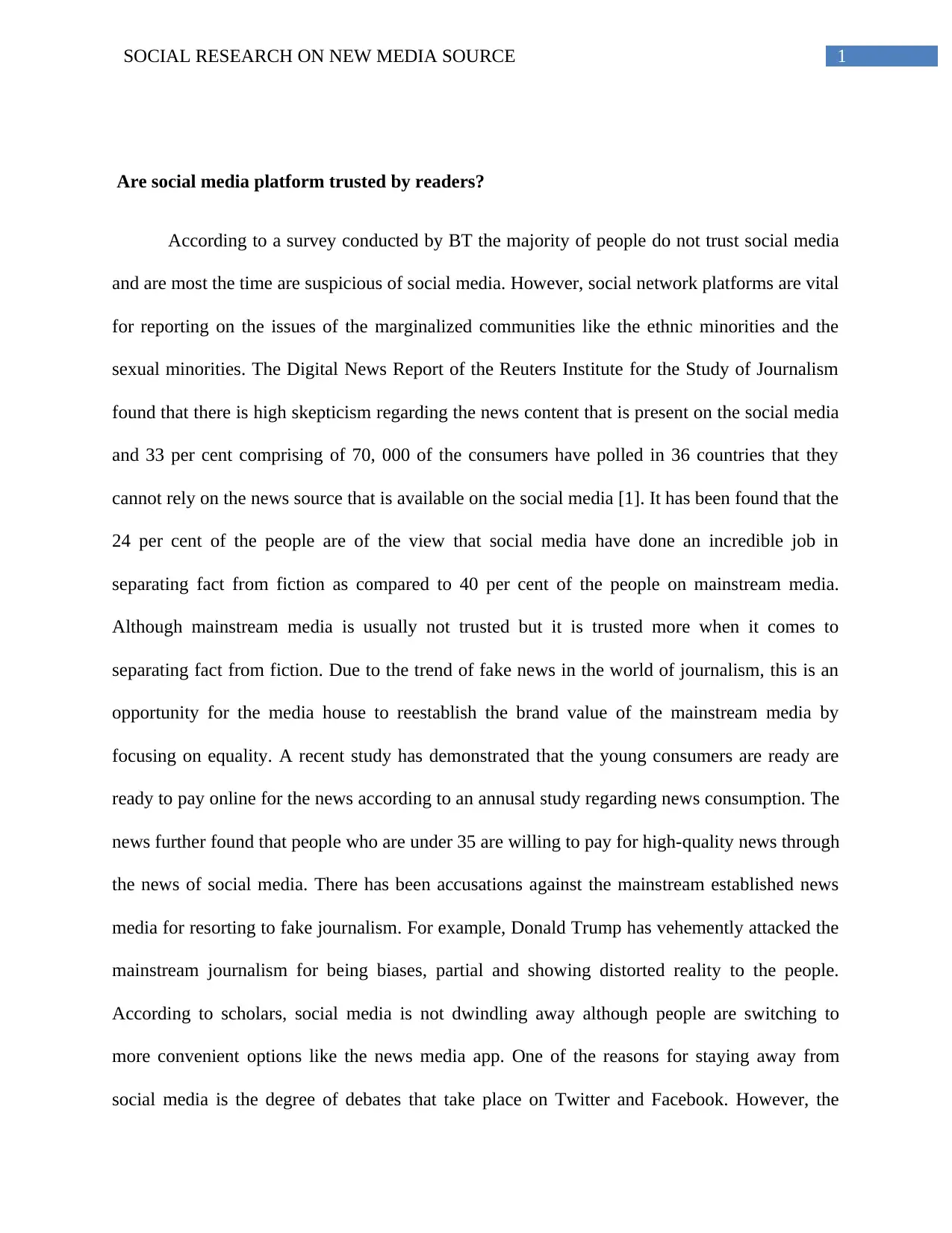
1SOCIAL RESEARCH ON NEW MEDIA SOURCE
Are social media platform trusted by readers?
According to a survey conducted by BT the majority of people do not trust social media
and are most the time are suspicious of social media. However, social network platforms are vital
for reporting on the issues of the marginalized communities like the ethnic minorities and the
sexual minorities. The Digital News Report of the Reuters Institute for the Study of Journalism
found that there is high skepticism regarding the news content that is present on the social media
and 33 per cent comprising of 70, 000 of the consumers have polled in 36 countries that they
cannot rely on the news source that is available on the social media [1]. It has been found that the
24 per cent of the people are of the view that social media have done an incredible job in
separating fact from fiction as compared to 40 per cent of the people on mainstream media.
Although mainstream media is usually not trusted but it is trusted more when it comes to
separating fact from fiction. Due to the trend of fake news in the world of journalism, this is an
opportunity for the media house to reestablish the brand value of the mainstream media by
focusing on equality. A recent study has demonstrated that the young consumers are ready are
ready to pay online for the news according to an annusal study regarding news consumption. The
news further found that people who are under 35 are willing to pay for high-quality news through
the news of social media. There has been accusations against the mainstream established news
media for resorting to fake journalism. For example, Donald Trump has vehemently attacked the
mainstream journalism for being biases, partial and showing distorted reality to the people.
According to scholars, social media is not dwindling away although people are switching to
more convenient options like the news media app. One of the reasons for staying away from
social media is the degree of debates that take place on Twitter and Facebook. However, the
Are social media platform trusted by readers?
According to a survey conducted by BT the majority of people do not trust social media
and are most the time are suspicious of social media. However, social network platforms are vital
for reporting on the issues of the marginalized communities like the ethnic minorities and the
sexual minorities. The Digital News Report of the Reuters Institute for the Study of Journalism
found that there is high skepticism regarding the news content that is present on the social media
and 33 per cent comprising of 70, 000 of the consumers have polled in 36 countries that they
cannot rely on the news source that is available on the social media [1]. It has been found that the
24 per cent of the people are of the view that social media have done an incredible job in
separating fact from fiction as compared to 40 per cent of the people on mainstream media.
Although mainstream media is usually not trusted but it is trusted more when it comes to
separating fact from fiction. Due to the trend of fake news in the world of journalism, this is an
opportunity for the media house to reestablish the brand value of the mainstream media by
focusing on equality. A recent study has demonstrated that the young consumers are ready are
ready to pay online for the news according to an annusal study regarding news consumption. The
news further found that people who are under 35 are willing to pay for high-quality news through
the news of social media. There has been accusations against the mainstream established news
media for resorting to fake journalism. For example, Donald Trump has vehemently attacked the
mainstream journalism for being biases, partial and showing distorted reality to the people.
According to scholars, social media is not dwindling away although people are switching to
more convenient options like the news media app. One of the reasons for staying away from
social media is the degree of debates that take place on Twitter and Facebook. However, the
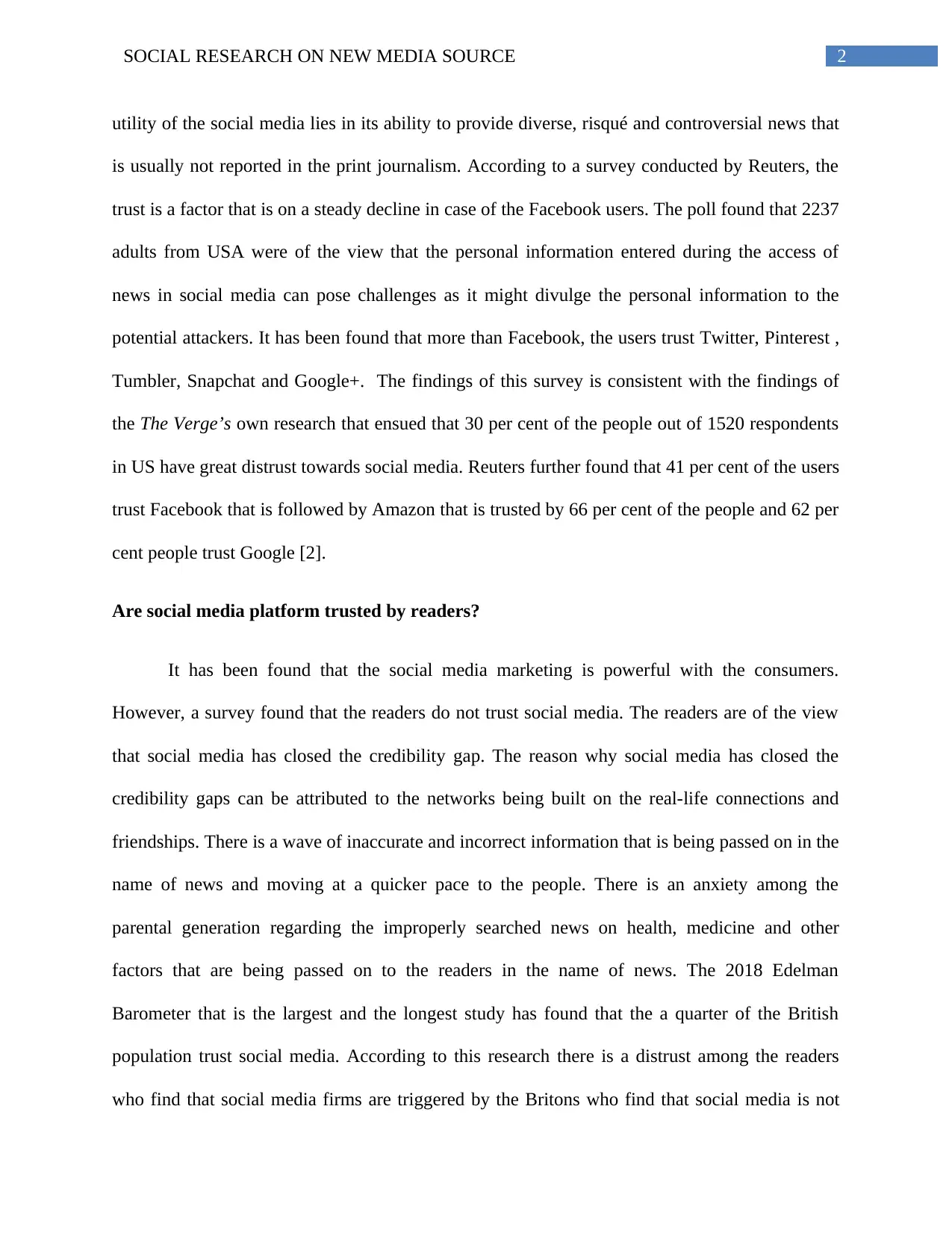
2SOCIAL RESEARCH ON NEW MEDIA SOURCE
utility of the social media lies in its ability to provide diverse, risqué and controversial news that
is usually not reported in the print journalism. According to a survey conducted by Reuters, the
trust is a factor that is on a steady decline in case of the Facebook users. The poll found that 2237
adults from USA were of the view that the personal information entered during the access of
news in social media can pose challenges as it might divulge the personal information to the
potential attackers. It has been found that more than Facebook, the users trust Twitter, Pinterest ,
Tumbler, Snapchat and Google+. The findings of this survey is consistent with the findings of
the The Verge’s own research that ensued that 30 per cent of the people out of 1520 respondents
in US have great distrust towards social media. Reuters further found that 41 per cent of the users
trust Facebook that is followed by Amazon that is trusted by 66 per cent of the people and 62 per
cent people trust Google [2].
Are social media platform trusted by readers?
It has been found that the social media marketing is powerful with the consumers.
However, a survey found that the readers do not trust social media. The readers are of the view
that social media has closed the credibility gap. The reason why social media has closed the
credibility gaps can be attributed to the networks being built on the real-life connections and
friendships. There is a wave of inaccurate and incorrect information that is being passed on in the
name of news and moving at a quicker pace to the people. There is an anxiety among the
parental generation regarding the improperly searched news on health, medicine and other
factors that are being passed on to the readers in the name of news. The 2018 Edelman
Barometer that is the largest and the longest study has found that the a quarter of the British
population trust social media. According to this research there is a distrust among the readers
who find that social media firms are triggered by the Britons who find that social media is not
utility of the social media lies in its ability to provide diverse, risqué and controversial news that
is usually not reported in the print journalism. According to a survey conducted by Reuters, the
trust is a factor that is on a steady decline in case of the Facebook users. The poll found that 2237
adults from USA were of the view that the personal information entered during the access of
news in social media can pose challenges as it might divulge the personal information to the
potential attackers. It has been found that more than Facebook, the users trust Twitter, Pinterest ,
Tumbler, Snapchat and Google+. The findings of this survey is consistent with the findings of
the The Verge’s own research that ensued that 30 per cent of the people out of 1520 respondents
in US have great distrust towards social media. Reuters further found that 41 per cent of the users
trust Facebook that is followed by Amazon that is trusted by 66 per cent of the people and 62 per
cent people trust Google [2].
Are social media platform trusted by readers?
It has been found that the social media marketing is powerful with the consumers.
However, a survey found that the readers do not trust social media. The readers are of the view
that social media has closed the credibility gap. The reason why social media has closed the
credibility gaps can be attributed to the networks being built on the real-life connections and
friendships. There is a wave of inaccurate and incorrect information that is being passed on in the
name of news and moving at a quicker pace to the people. There is an anxiety among the
parental generation regarding the improperly searched news on health, medicine and other
factors that are being passed on to the readers in the name of news. The 2018 Edelman
Barometer that is the largest and the longest study has found that the a quarter of the British
population trust social media. According to this research there is a distrust among the readers
who find that social media firms are triggered by the Britons who find that social media is not
⊘ This is a preview!⊘
Do you want full access?
Subscribe today to unlock all pages.

Trusted by 1+ million students worldwide
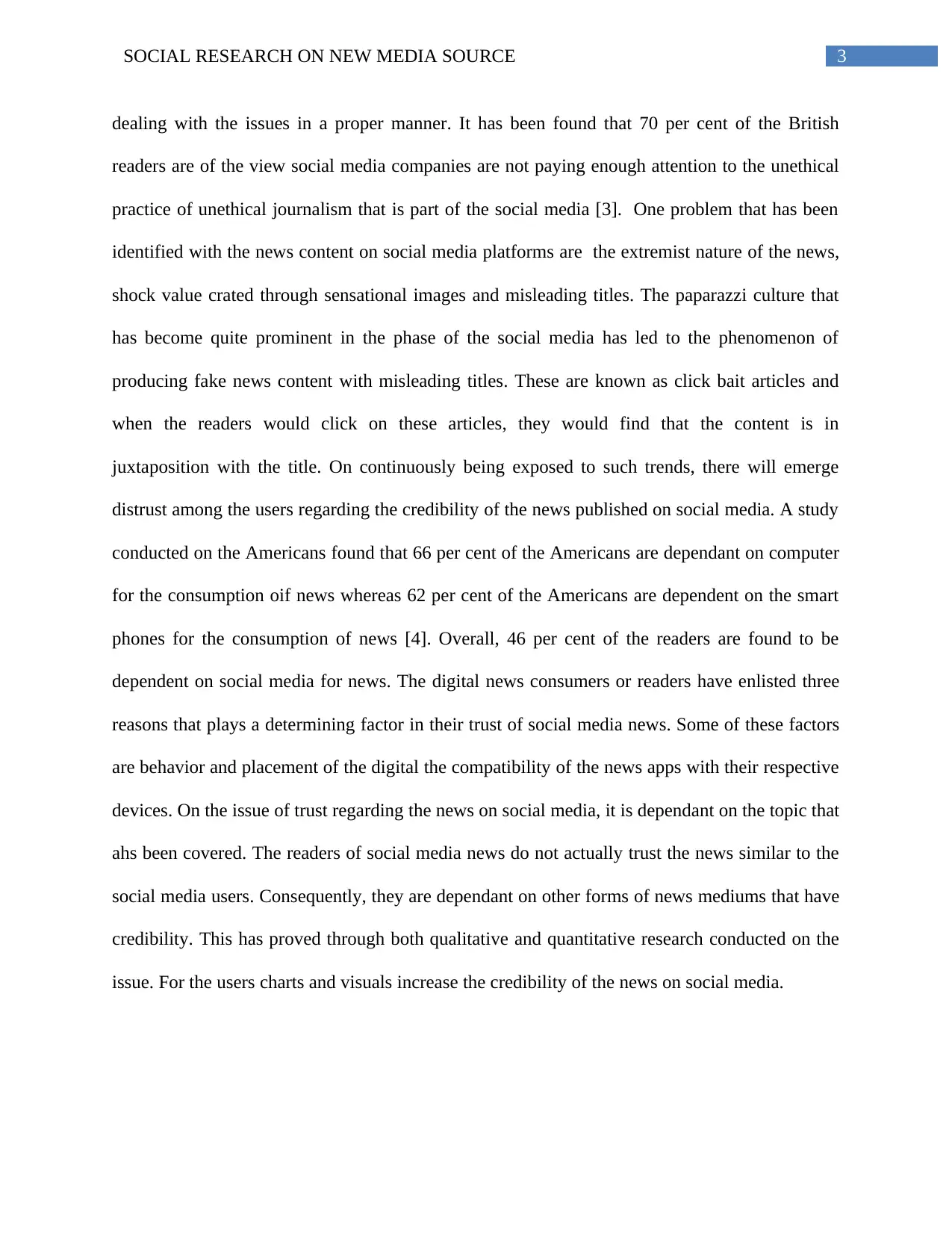
3SOCIAL RESEARCH ON NEW MEDIA SOURCE
dealing with the issues in a proper manner. It has been found that 70 per cent of the British
readers are of the view social media companies are not paying enough attention to the unethical
practice of unethical journalism that is part of the social media [3]. One problem that has been
identified with the news content on social media platforms are the extremist nature of the news,
shock value crated through sensational images and misleading titles. The paparazzi culture that
has become quite prominent in the phase of the social media has led to the phenomenon of
producing fake news content with misleading titles. These are known as click bait articles and
when the readers would click on these articles, they would find that the content is in
juxtaposition with the title. On continuously being exposed to such trends, there will emerge
distrust among the users regarding the credibility of the news published on social media. A study
conducted on the Americans found that 66 per cent of the Americans are dependant on computer
for the consumption oif news whereas 62 per cent of the Americans are dependent on the smart
phones for the consumption of news [4]. Overall, 46 per cent of the readers are found to be
dependent on social media for news. The digital news consumers or readers have enlisted three
reasons that plays a determining factor in their trust of social media news. Some of these factors
are behavior and placement of the digital the compatibility of the news apps with their respective
devices. On the issue of trust regarding the news on social media, it is dependant on the topic that
ahs been covered. The readers of social media news do not actually trust the news similar to the
social media users. Consequently, they are dependant on other forms of news mediums that have
credibility. This has proved through both qualitative and quantitative research conducted on the
issue. For the users charts and visuals increase the credibility of the news on social media.
dealing with the issues in a proper manner. It has been found that 70 per cent of the British
readers are of the view social media companies are not paying enough attention to the unethical
practice of unethical journalism that is part of the social media [3]. One problem that has been
identified with the news content on social media platforms are the extremist nature of the news,
shock value crated through sensational images and misleading titles. The paparazzi culture that
has become quite prominent in the phase of the social media has led to the phenomenon of
producing fake news content with misleading titles. These are known as click bait articles and
when the readers would click on these articles, they would find that the content is in
juxtaposition with the title. On continuously being exposed to such trends, there will emerge
distrust among the users regarding the credibility of the news published on social media. A study
conducted on the Americans found that 66 per cent of the Americans are dependant on computer
for the consumption oif news whereas 62 per cent of the Americans are dependent on the smart
phones for the consumption of news [4]. Overall, 46 per cent of the readers are found to be
dependent on social media for news. The digital news consumers or readers have enlisted three
reasons that plays a determining factor in their trust of social media news. Some of these factors
are behavior and placement of the digital the compatibility of the news apps with their respective
devices. On the issue of trust regarding the news on social media, it is dependant on the topic that
ahs been covered. The readers of social media news do not actually trust the news similar to the
social media users. Consequently, they are dependant on other forms of news mediums that have
credibility. This has proved through both qualitative and quantitative research conducted on the
issue. For the users charts and visuals increase the credibility of the news on social media.
Paraphrase This Document
Need a fresh take? Get an instant paraphrase of this document with our AI Paraphraser
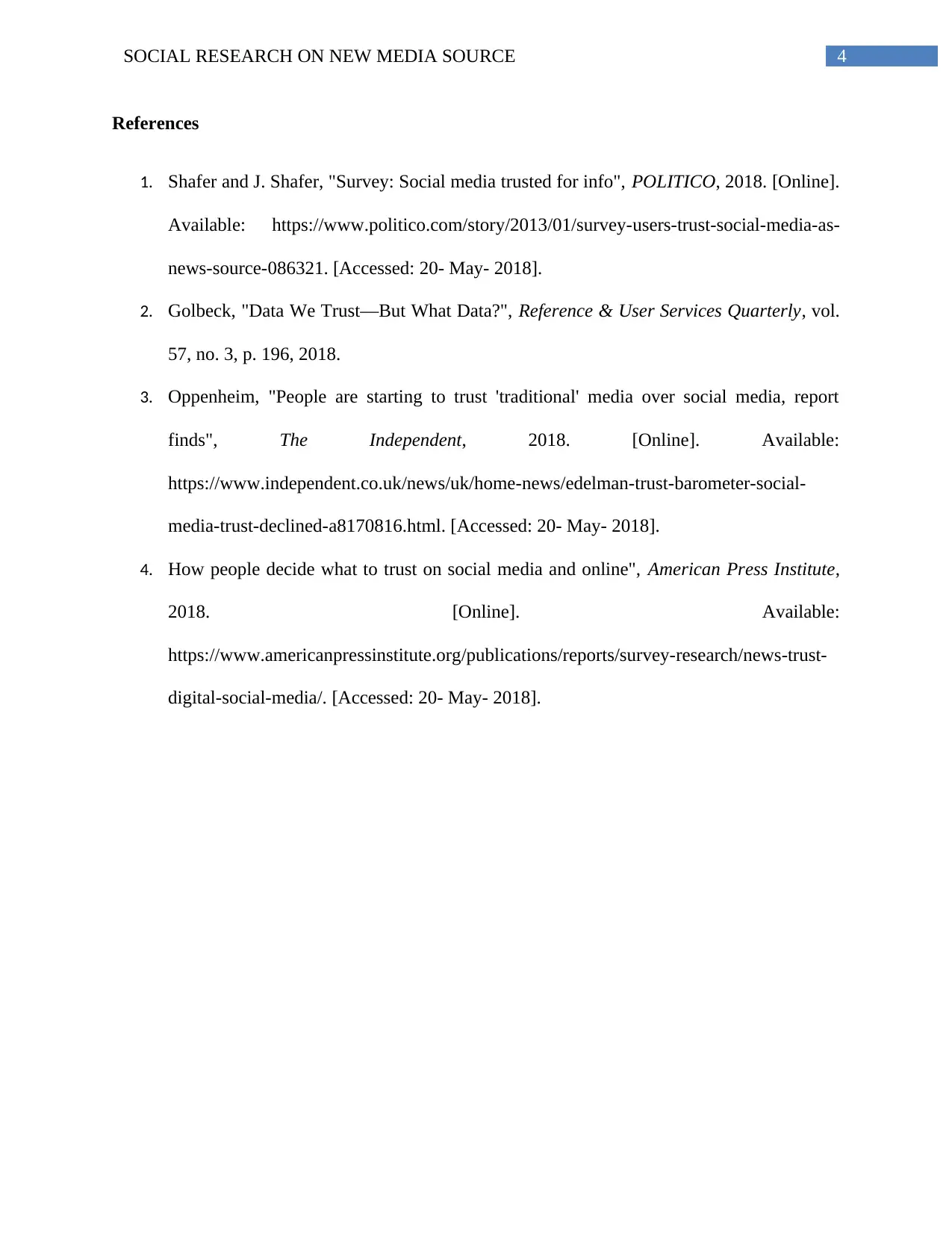
4SOCIAL RESEARCH ON NEW MEDIA SOURCE
References
1. Shafer and J. Shafer, "Survey: Social media trusted for info", POLITICO, 2018. [Online].
Available: https://www.politico.com/story/2013/01/survey-users-trust-social-media-as-
news-source-086321. [Accessed: 20- May- 2018].
2. Golbeck, "Data We Trust—But What Data?", Reference & User Services Quarterly, vol.
57, no. 3, p. 196, 2018.
3. Oppenheim, "People are starting to trust 'traditional' media over social media, report
finds", The Independent, 2018. [Online]. Available:
https://www.independent.co.uk/news/uk/home-news/edelman-trust-barometer-social-
media-trust-declined-a8170816.html. [Accessed: 20- May- 2018].
4. How people decide what to trust on social media and online", American Press Institute,
2018. [Online]. Available:
https://www.americanpressinstitute.org/publications/reports/survey-research/news-trust-
digital-social-media/. [Accessed: 20- May- 2018].
References
1. Shafer and J. Shafer, "Survey: Social media trusted for info", POLITICO, 2018. [Online].
Available: https://www.politico.com/story/2013/01/survey-users-trust-social-media-as-
news-source-086321. [Accessed: 20- May- 2018].
2. Golbeck, "Data We Trust—But What Data?", Reference & User Services Quarterly, vol.
57, no. 3, p. 196, 2018.
3. Oppenheim, "People are starting to trust 'traditional' media over social media, report
finds", The Independent, 2018. [Online]. Available:
https://www.independent.co.uk/news/uk/home-news/edelman-trust-barometer-social-
media-trust-declined-a8170816.html. [Accessed: 20- May- 2018].
4. How people decide what to trust on social media and online", American Press Institute,
2018. [Online]. Available:
https://www.americanpressinstitute.org/publications/reports/survey-research/news-trust-
digital-social-media/. [Accessed: 20- May- 2018].
1 out of 5
Related Documents
Your All-in-One AI-Powered Toolkit for Academic Success.
+13062052269
info@desklib.com
Available 24*7 on WhatsApp / Email
![[object Object]](/_next/static/media/star-bottom.7253800d.svg)
Unlock your academic potential
Copyright © 2020–2026 A2Z Services. All Rights Reserved. Developed and managed by ZUCOL.



